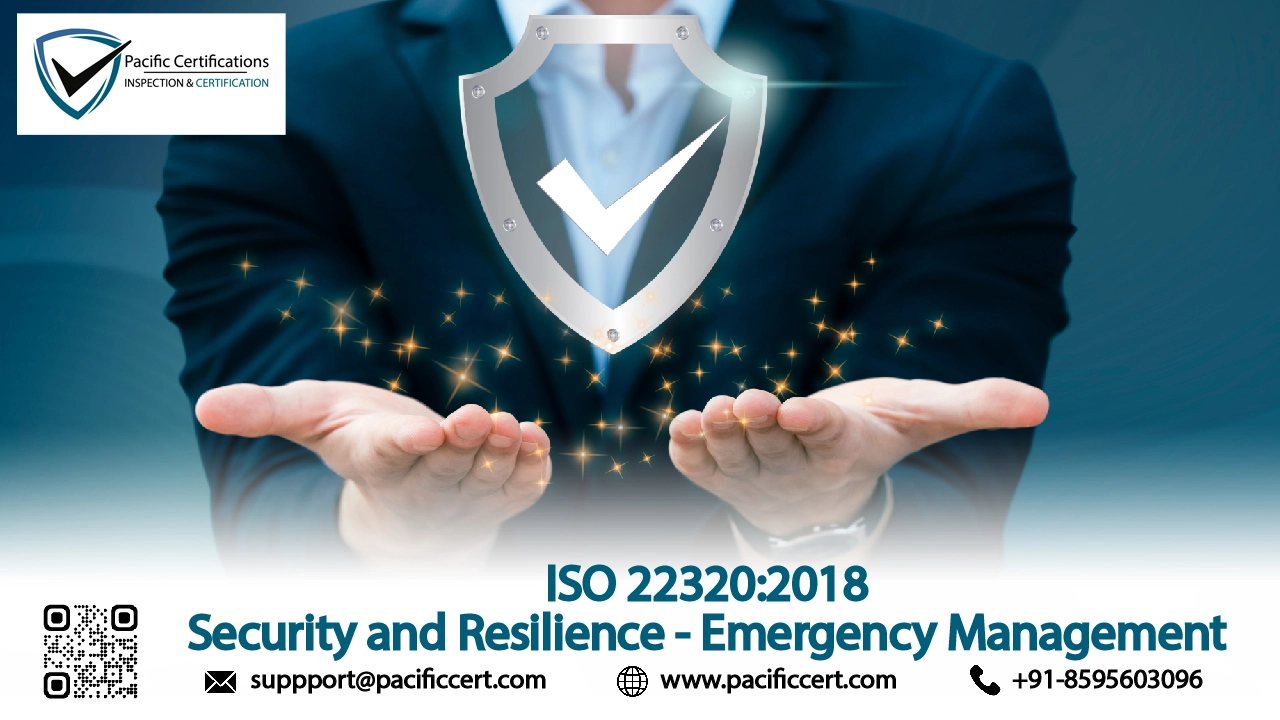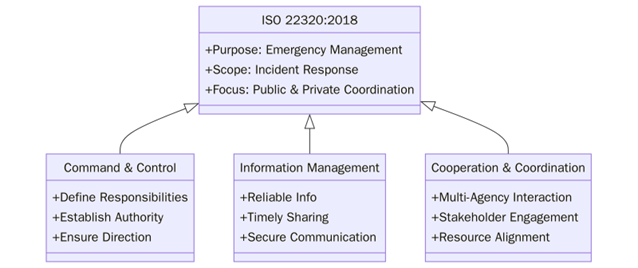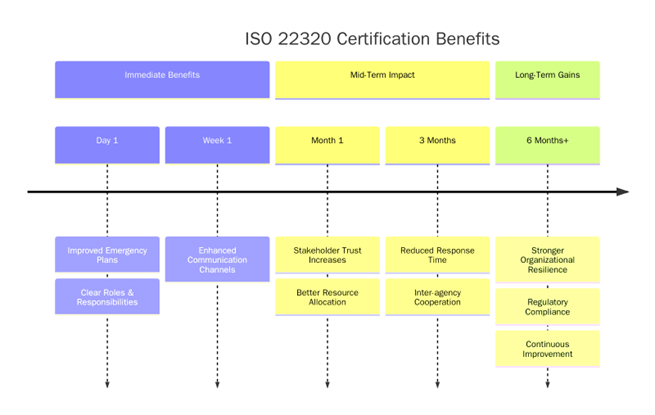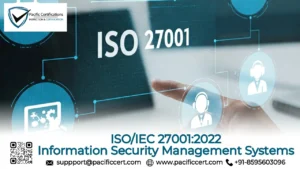What is ISO 22320:2018?

ISO 22320:2018 is an international standard that guides organizations in managing emergencies by improving coordination among responders and supporting the safety of communities and governments. It sets out how to prepare for emergencies, respond in real time and recover without disruption.
The standard focuses on the full cycle of emergency management from planning to risk reduction. It highlights the need for clear roles, timely communication and strong leadership to protect people and restore services.
Using ISO 22320:2018 helps build a reliable emergency framework that strengthens resilience and ensures a faster return to normal after a crisis.
For more information, contact us at support@pacificcert.com.
Purpose
The purpose of ISO 22320 is to provide organizations with a overreaching framework for managing emergencies. The standard aims to help organizations establish clear processes and procedures to respond to incidents effectively and smoothly. It focuses on improving decision-making and communication during emergencies, ensuring that all stakeholders are aligned and that resources are effectively mobilized.

By adhering to ISO 22320:2018, organizations can improve their ability to respond to crises and disasters, minimize the impact on people, assets, and operations, and facilitate faster recovery.
Scope and Applicability
ISO 22320 applies to organizations of all sizes and industries involved in emergency management, including governments, private companies, NGOs, and healthcare providers. It is relevant to any organization that is responsible for coordinating emergency responses, such as first responders, emergency service organizations, and crisis management teams.
The standard is applicable across a wide range of emergency situations, including natural disasters, man-made events, public health emergencies, and security incidents. ISO 22320 is designed to be flexible and scalable, making it suitable for local, regional, and national-level emergency management operations.
Key Definitions
- Emergency Management: The process of preparing for, responding to, and recovering from emergencies to protect people, property, and the environment.
- Incident Management: The coordination and management of resources and activities during an emergency to achieve specific objectives, such as saving lives, protecting property, and restoring operations.
- Crisis Communication: The process of managing information and communication during an emergency, ensuring that accurate, timely, and clear messages are delivered to all relevant stakeholders.
- Resilience: The ability of an organization or community to adapt to, recover from, and thrive in the face of disruptive events.
Clause-wise structure of ISO 22320
Clause Number | Title | Description |
Clause 1 | Scope | Defines the scope of the standard and its applicability to emergency management practices. |
Clause 2 | Normative References | Lists the documents and standards that are referenced within ISO 22320:2018. |
Clause 3 | Terms and Definitions | Provides clear definitions for terms used in the standard, ensuring consistency. |
Clause 4 | Principles of Emergency Management | Outlines the key principles that guide emergency management, including coordination, communication, and decision-making. |
Clause 5 | Emergency Management Process | Details the steps involved in the emergency management process, from preparation to recovery. |
Clause 6 | Roles and Responsibilities | Specifies the roles and responsibilities of stakeholders involved in emergency management. |
Clause 7 | Incident and Crisis Management | Describes how to manage incidents and crises effectively, focusing on incident identification, response, and resolution. |
Clause 8 | Communication and Information Sharing | Provides guidance on how to ensure effective communication and information sharing during emergencies. |
Clause 9 | Monitoring, Review, and Improvement | Encourages organizations to continually review and improve their emergency management practices. |
What are the requirements of ISO 22320:2018?
ISO 22320 establishes specific requirements that organizations must follow to effectively manage emergencies. These requirements are designed to ensure that emergency management processes are smooth, coordinated, and transparent. Key requirements include:

- Organizations must establish a clear framework for coordinating resources and efforts during emergencies. This includes defining roles, responsibilities, and communication channels.
- Organizations are required to conduct regular risk assessments to identify potential threats and vulnerabilities. Emergency preparedness plans should be developed to address these risks.
- The standard specifies that organizations must implement an effective response system, which includes well-defined procedures for incident management, decision-making, and resource allocation.
- Organizations should develop and implement a crisis communication plan to ensure the timely and accurate flow of information during an emergency.
- Post-emergency recovery plans should be in place to restore normal operations quickly, with attention to business continuity and the well-being of affected individuals.
- Regular training sessions and emergency drills should be conducted to prepare personnel for responding to various emergency scenarios.
For more information, contact us at support@pacificcert.com.
ISO 22320 Certification: Audit Checklist
The audit checklist for ISO 22320 certification typically includes the following:
- Have cloud roles and responsibilities between the provider and customer been clearly defined and documented?
- Is virtual machine configuration securely managed and isolated in multi-tenant cloud environments?
- Are procedures in place for the secure return, deletion, or migration of customer assets after contract termination?
- Is administrative access by cloud service customers properly controlled and monitored by the provider?
- Are cloud-specific security requirements addressed in the service agreement (data location, jurisdiction etc.)?
- Is customer activity within the cloud environment logged, monitored, and reviewed for anomalies?
- Are customers informed of any changes that may affect cloud service security controls or SLAs?
- Are measures implemented to segregate and protect customer data in shared infrastructure setups?
- Is there a documented process for handling cloud-specific incidents and notifying affected parties?
What are the benefits of ISO 22320 Certification?
ISO 22320 certification offers numerous benefits for organizations involved in emergency management. Below are some of the key benefits of obtaining ISO 22320:2018 certification:

- Certification ensures that organizations are well-prepared and equipped to respond effectively to emergencies, minimizing the impact of incidents.
- The standard upgrades communication systems, ensuring that all stakeholders receive accurate and timely information during an emergency.
- Certification helps organizations meet legal and regulatory requirements related to emergency preparedness and response.
- It helps organizations build resilience by ensuring that they can recover quickly from crises and reduce the impact of future disruptions.
As the frequency and complexity of emergencies increase worldwide, the demand for ISO 22320:2018 certification is expected to grow significantly in the recent years. Organizations in all sectors will continue to prioritize improving their emergency management systems to ensure they can respond effectively to emergencies and minimize disruptions to their operations. The field of emergency management is continuously evolving, and organizations must stay up to date with the latest developments and trends
As cyber threats become more prevalent, organizations are placing greater emphasis on integrating cybersecurity into their emergency management frameworks. The use of smart technologies such as AI, drones and IoT devices is transforming how emergencies are managed. Emergency management and business continuity planning are increasingly being integrated to ensure that organizations can continue critical operations during and after a crisis.
Certification Process: ISO 22320:2018
The certification process for ISO 22320:2018 typically includes the following steps:
- Pre-Certification Assessment: Conducting a gap analysis to assess the organization’s current emergency management practices and identify areas for improvement.
- Documentation Review: Reviewing the organization’s emergency management plans, procedures, and records to ensure they align with ISO 22320:2018 requirements.
- Stage 1 Audit: A preliminary audit to assess the organization’s readiness for certification and identify potential issues.
- Stage 2 Audit: A overreaching audit to evaluate the implementation of emergency management practices and their effectiveness in real-life scenarios.
- Certification Decision: Certification is awarded once the organization meets all the requirements outlined in ISO 22320.
- Ongoing Monitoring: Regular surveillance audits to ensure continued compliance and improvement of emergency management processes.
Timeline
The timeline for ISO 22320 certification generally spans several months. The pre-assessment and preparation phase takes 1-2 months, during which the organization reviews its current security practices. The Stage 1 audit usually lasts about 1 month. The Stage 2 audit, which involves a more overreaching evaluation, takes 1-2 months. Certification issuance occurs within 3-6 months, depending on audit findings and the organization’s readiness.
What is the cost of ISO 22320:2018?
The cost of ISO 22320 certification can vary depending on the size of the organization, the complexity of its emergency management practices, and the number of locations involved. Typical costs include:
Audit Fee is the Fee for the certification body’s audit process. Training costs are the costs for educating staff on ISO 22320 and the necessary processes for compliance. Ongoing maintenance are the costs for regular audits and recertification required every 3 years.
How Pacific Certifications Can Help?
At Pacific Certifications, we provide overreaching auditing and certification services for ISO 22320:2018. Our team will guide you through the entire certification process, ensuring that your emergency management practices meet the highest standards. Our services include:
- Stage 1 and Stage 2 audits to evaluate your emergency management practices.
- Objective conformity assessments based on ISO 22320:2018.
- Certification issuance upon successful completion of the audit.
- Ongoing surveillance audits to ensure continued compliance.
- Support for multi-site or global operations.
For audits and certification, contact support@pacificcert.com.
ISO 22320:2018 Training and Courses
Various training courses are available to help organizations comply with ISO 22320, including:
- Lead Auditor Training – Equips professionals to conduct external third-party audits.
- Lead Implementer Training – For those responsible for planning and executing ISO 22320 implementation.
- Internal Auditor Training – Preparing internal auditors for certification audits
Pacific Certifications provides accredited training programs. If your organization is looking for ISO training, our team is equipped to help you. Contact us at support@pacificcert.com.
Frequently Asked Questions (FAQs)
How long does it take to get ISO 22320 certification?
The certification process typically takes 3–6 months, depending on your organization’s preparedness and audit outcomes.
Is ISO 22320 certification mandatory for all organizations?
ISO 22320 certification is not mandatory but is highly recommended for organizations looking to improve their emergency management practices and show compliance with global safety standards.
What are the main benefits of ISO 2232 certification?
Certification ensures effective emergency management, improves resilience, upgrades customer trust, and supports compliance with relevant regulations.
How often do I need to renew ISO 22320 certification?
ISO 22320:2018 certification is valid for three years, after which recertification is required.
Ready to get ISO 22320:2018 certified?
Contact Pacific Certifications to begin your certification journey today!
Suggested Certifications –
Read more: Pacific Blogs






